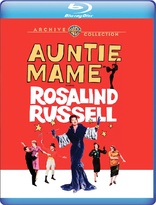Auntie Mame Blu-ray Movie
HomeAuntie Mame Blu-ray Movie 
Warner Archive CollectionWarner Bros. | 1958 | 144 min | Not rated | Dec 05, 2017
Movie rating
7.5 | / 10 |
Blu-ray rating
| Users | 4.5 | |
| Reviewer | 4.0 | |
| Overall | 4.0 |
Overview
Auntie Mame (1958)
Ten-year-old orphan Patrick Dennis has come to live with his nearest relative, Auntie Mame, a marvelous madcap who lives life to the hilt. Mame and her cronies create mayhem, while the sober banker in charge of Patrick's inheritance steers him toward a "respectable" future. Whose influence will prevail? The sedate banker or the irrepressible aunt whose motto is "Life is a banquet -- and most poor suckers are starving to death" ?
Starring: Rosalind Russell, Forrest Tucker, Coral Browne, Fred Clark (I), Patric KnowlesDirector: Morton DaCosta
| Coming of age | Uncertain |
| Comedy | Uncertain |
| Adventure | Uncertain |
| Drama | Uncertain |
Specifications
Video
Video codec: MPEG-4 AVC
Video resolution: 1080p
Aspect ratio: 2.40:1
Original aspect ratio: 2.35:1
Audio
English: DTS-HD Master Audio 2.0 (48kHz, 24-bit)
Music: DTS-HD Master Audio 2.0
Subtitles
English SDH
Discs
Blu-ray Disc
Single disc (1 BD)
Playback
Region A, B (C untested)
Review
Rating summary
| Movie | 3.5 | |
| Video | 5.0 | |
| Audio | 4.0 | |
| Extras | 2.0 | |
| Overall | 4.0 |
Auntie Mame Blu-ray Movie Review
Russell Reigns in Technirama
Reviewed by Michael Reuben December 6, 2017Auntie Mame began as a 1955 novel by American author Patrick Dennis, who insisted that the
story wasn't autobiographical even though the protagonist shares his name. (The claim is made
more credible by the fact that "Patrick Dennis" was a pseudonym; the author's real name was
Edward Everett Tanner III.) The book was adapted into a successful play that premiered on
Broadway just one year after publication of the novel. A movie version appeared two years later,
helmed by the play's director, Morton DaCosta, in his first foray into feature films. Warner
Brothers released Auntie Mame to theaters in the final days of 1958, and it went on to become
one of the most profitable box office performers of the following year. The key to the success of
both the play and the film was actress Rosalind Russell, whose towering performance still lights
up the screen today, almost sixty years after Auntie Mame first delighted audiences.
Auntie Mame has been somewhat overshadowed by the 1966 Broadway musical adaptation that
became one of Angela Lansbury's signature roles. In what was widely decried as a travesty,
Lansbury was passed over for the filmed version in favor of Lucille Ball, who lacked the
musical
chops for the part. The 1974 film tanked at the box office, even as several of composer Jerry
Herman's songs have become standards (notably, "We Need a Little Christmas"). On film,
Rosalind Russell's incarnation of Patrick Dennis' irrepressible aunt remains the definitive
portrayal.
The Warner Archive Collection is releasing the original 1958 film on Blu-ray, and even if Auntie
Mame isn't entirely to your taste (as it isn't to mine), the disc is an impressive technical
achievement proving that you don't need computers to create eye candy. The film was one of the
handful shot in a now-abandoned widescreen process known as Technirama, which could
produce an image of superb sharpness and clarity when projected from a native element, which it
almost never was. But WAC has sourced its Blu-ray from just such a native Technirama element,
and the results are a visual delight.

Auntie Mame opens with the will of Edwin Dennis, recited in voiceover by director DaCosta. In the event of his death, which the successful businessman expects not to happen until far in the distant future, he reluctantly assigns custody of his son, Patrick (Jan Handzlik), to the boy's aunt, Mame (Russell), despite Edwin's overt disapproval of his sister's character and lifestyle. Oversight of the fortune left to the boy is placed in the hands of banker Dwight Babcock (Fred Clark), a diehard fuddy-duddy who is guaranteed to share Edwin's disapproval of Auntie Mame.
When Edwin unexpectedly croaks, young Patrick arrives at his aunt's spacious New York apartment to discover a three-ring circus of which Auntie Mame is the perpetual center. Current regulars include Mame's dutiful Japanese houseboy, Ito (Yuki Shimoda); actress Vera Charles (Coral Browne), a friend from Mame's days on the stage; publisher Lindsay Woolsey (Patric Knowles), who remains devoted to Mame even though she keeps rejecting his marriage proposals; and Acacius Page (Henry Brandon), headmaster of a progressive downtown school that would be considered extreme even by today's standards. (Patrick is briefly enrolled there, until an outraged Mr. Babcock intervenes and sends him to boarding school.) In due time, Mame's circle will expand to include Norah (Connie Gilchrist), the housekeeper who brings Patrick to New York; a mousy secretary with the unlikely name of Agnes Gooch (Peggy Cass); and a hack writer named Brian O'Bannion (Robin Hughes).
Auntie Mame is loosely plotted, falling into roughly three chapters united by the sheer force of the title character's whirlwind personality. In the first chapter, Patrick's aunt introduces the lad to the continuous party of her carefree Roaring Twenties milieu. In the second, after Mame has lost her money in the stock market crash of 1929, she muddles through a succession of jobs, including a brief but disastrous return to the stage with Vera, until fortune brings her to the attention of a wealthy Southern oilman, Beauregard Jackson Pickett Burnside (Forrest Tucker); Burnside marries Mame over the objections of his outraged mother (Carol Veazie), leading to country escapades like a fox hunt for which citified Mame is utterly unprepared. In the third chapter, Mame, now single again, returns to New York to write her memoirs and is appalled to find that Patrick (played as an adult by Roger Smith) has been molded by Mr. Babcock into his own image of strait-laced conservatism. Patrick is preparing to marry a society girl, Gloria Upson (Joanna Barnes), who speaks in a bad impression of Katharine Hepburn and whose family is proud to live in a Connecticut neighborhood from which Jews are excluded. Mame can't stand either the girl or her family, and she schemes to show Patrick the error of his ways and rescue him from what she deems a ghastly mistake by wrecking the engagement.
Mame lives by her famous motto that "[l]ife is a banquet and most poor suckers are starving to death!" Her determination to treat life's banquet as an all-you-can-eat buffet often gets her into trouble, and it also makes her interesting to watch. Still, it's hard not to notice, as the film continues, that Mame's gluttony at life's table routinely comes at the expense of others. (Spoiler alert, though none of what follows is much of a surprise.) Her loving husband meets an untimely end during their far-flung overseas travels, her devoted secretary ends up pregnant after a drunken night of indulgence to which Mame has encouraged her, and Patrick gets shipped off to boarding school and the Ivy League while his aunt gallivants to the South and around the world (though she hugs him tightly whenever she sees him). It's hardly a surprise when Mame's nephew matures into a mini-Babcock, since, for all his faults, the banker pays more attention to the boy's upbringing than his aunt does. With all her bohemian zest for living, Mame remains the ultimate version of the cool but unreliable relative—aunt, cousin, errant sibling—who drives parents crazy, because their kids wonder why mom and dad are so tough and inflexible, when in fact they're just doing their job. After two hours of comically irresponsible hijinks, Auntie Mame ultimately has to stack the deck in Mame's favor by giving Patrick a dubious engagement from which his wise old aunt can rescue him—but it's the first good deed she's done for her nephew in years.
It's all the more credit to Rosalind Russell's performance that she effectively papers over these character flaws with a performance that blazes through the screen and makes Mame's foibles seem charming. Russell is ably supported by a collection of players who seem to understand that they're there to be upstaged, as well as by a colorful production design that visually expresses the intensity with which Auntie Mame experiences the world. Her costumes are a study in excess, and she changes her hair color almost as often as her clothes. Auntie Mame often looks stage-bound, with its artificial decor, tableaus of characters arrayed across the stage screen and theatrical flourishes like the bright light that remains on Mame's face during fadeouts—but all of that is appropriate to the character and her story. Life for Patrick Dennis' aunt may be a banquet, but it's also a continuous performance, and Mame is the one and only star.
Auntie Mame Blu-ray Movie, Video Quality 
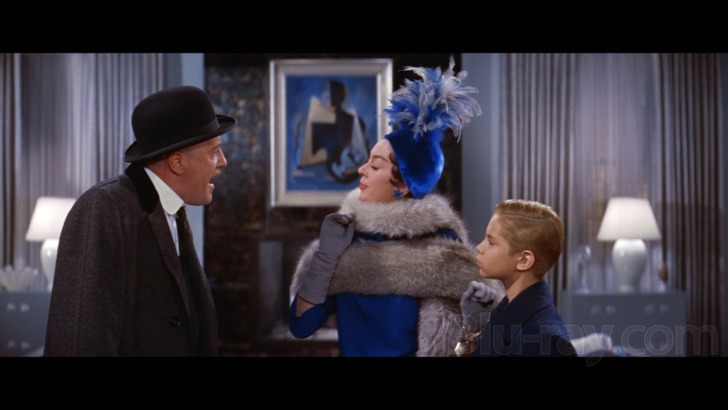
Auntie Mame was photographed by venerable cinematographer Harry Stradling, Sr. (My Fair
Lady) in the widescreen format known as Technirama. Like Paramount's VistaVision,
Technirama ran the film horizontally instead of vertically, and it doubled the size of each frame
from 4-perf to 8-perf, enhancing sharpness and reducing visible grain. Unlike VistaVision,
however, Technirama used an anamorphic stretch of 1.5:1 to fill the expanded negative with an
image that could be projected at the CinemaScope ratio of 2.35:1. For release prints, this image
would then be downconverted with a horizontal CinemaScope squeeze to reshape each frame into
a standard 4-perf format that commercial theaters were equipped to project. These interim
conversions often had the unfortunate effect of lessening sharpness and accentuating grain,
thereby negating some of the advantages for which Technirama was developed. (It's not hard to
grasp why the format didn't survive.)
For this 1080p, AVC-encoded Blu-ray, the Warner Archive Collection has returned to a rare
Technirama-format interpositive, which was struck from the camera negative by YCM Laboratories several decades ago, before the negative suffered
significant fading. The scan was performed at 2K by Warner's Motion Picture Imaging facility, and color correction was undertaken by the
senior colorist at MPI who has been entrusted with restoring many of Warner's most valuable
properties. An original dye transfer print was used as a color reference, and MPI's work was
followed by WAC's customary thorough cleaning to remove dirt, scratches and other age-related
deterioration.
The end result is a Blu-ray image of stunning sharpness and clarity, with deep and rich primary
colors and a rainbow of shadings in between. (Appropriately enough, the film's introductory
titles open with a kaleidoscope.) Auntie Mame's apparently inexhaustible wardrobe is as much a
character in the film as she is, and the Blu-ray presentation makes it pop off the screen. Grain is
almost imperceptible, and the image is so finely resolved that, when Mame is presiding over a
party on her terrace overlooking the 59th Street Bridge, the scrim at the back of the stage looks
just like the painting it is (and a beautifully detailed one at that). The eccentric and ever-changing
decor of Mame's apartment is vividly rendered, while the detail of Beauregard Burnside's South
Carolina plantation is white-and-pastel eye candy accentuated by the bright red riding coats of the
fox hunt. The counters at Macy's, where Mame meets her future husband, are a study in stylized
stage decor, and the exotic locales where Mame and Beauregard travel are striking in all of their
soundstage artificiality. Blacks are solid and deep, and there isn't a hint of untoward electronic
tinkering. Auntie Mame was shot on film some sixty years ago, but its presentation on Blu-ray
favorably stands comparison to contemporary productions that have been digitally acquired. The
Blu-ray is a tribute to the continuing vitality of celluloid.
As per its usual practice, WAC has mastered Auntie Mame at a high average bitrate, here 34.99
Mbps.
Auntie Mame Blu-ray Movie, Audio Quality 
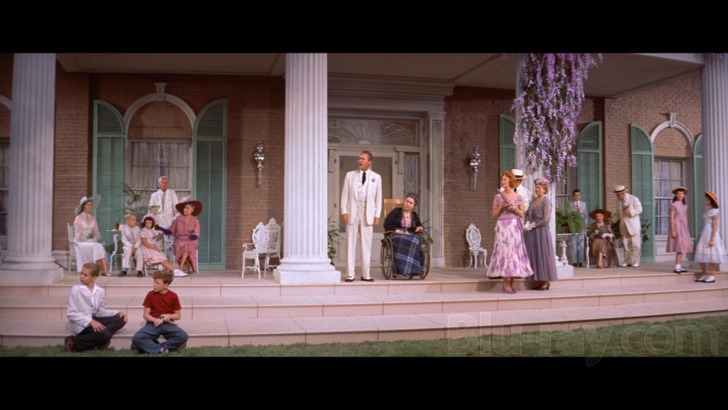
Rumors have persisted for years that Auntie Mame received a stereo mix, but WAC has scoured the Warner archives and found none. The Blu-ray contains a mono track taken from the original magnetic masters, cleaned of any age-related interference or distortion and encoded in lossless DTS-HD MA 2.0. It's an effective track that faithfully reproduces Rosalind Russell's famous ability to deliver dialogue at lightning speed—she talks even faster here than in His Girl Friday—and the distinctive tones of supporting characters, including Forest Tucker's ripe Southern accent and Peggy Cass's broadly comic tones as the put-upon Miss Gooch. Effects sound faintly artificial, which is consistent with the staginess of the overall production. The lovely orchestral score by Bronislau Kaper (an Oscar winner for Lili) has ample room to breathe, even in mono.
Auntie Mame Blu-ray Movie, Special Features and Extras 
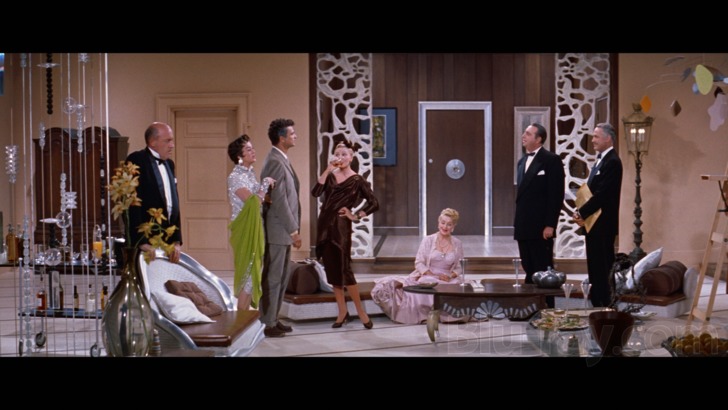
The extras have been ported over from Warner's 2002 DVD of Auntie Mame. The trailers have
been remastered in 1080p, and the music-only track has been given a lossless encode.
- Music Only Track: Bronislau Kaper's score, taken from a digital copy of the (mono) magnetic music track and encoded in lossless DTS-HD MA 2.0.
- Auntie Mame (1958) Theatrical Trailer (1080p; 1.85:1; 3:09).
- Mame (1974) Theatrical Trailer (1080p; 2.35:1; 3:43).
Auntie Mame Blu-ray Movie, Overall Score and Recommendation 
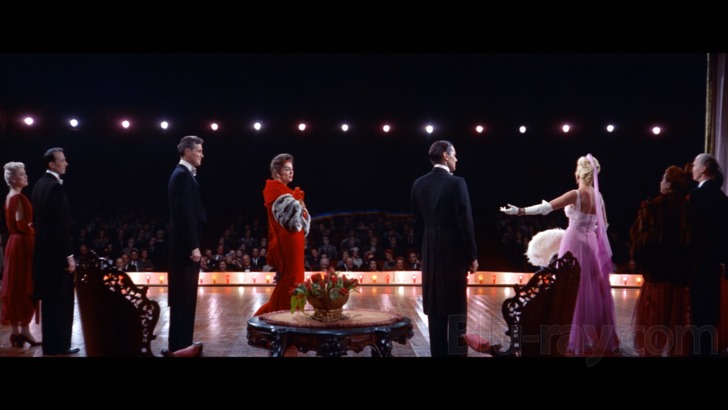
It's not surprising that Auntie Mame became a musical, because it already feels like one in
Rosalind Russell's performance. The gestures are extravagant, the emotions are operatic, and the
dialogue, especially Mame's, has its own rhythm and melody. Russell was reportedly offered
the musical role on stage but declined due to ill health—or maybe she felt that she'd already done
it. WAC's Blu-ray brings her performance home with stunning intensity. Even if the film doesn't
grab you as it did audiences in the Fifties, the disc is highly recommended. It's the best MGM
musical that MGM never made (and isn't even a musical).
Similar titles
Similar titles you might also like

Jolene
2008

David Copperfield
1935

The Art of Racing in the Rain
2019

About Schmidt
2002

A Little Help
2010

The Full Monty
1997

The Secret Life of Bees
2008

Transamerica
2005

The Sterile Cuckoo
1969

No Reservations
2007

My Favorite Blonde
1942

Susan Slept Here
Warner Archive Collection
1954

Hawaii
1966

Meet Monica Velour
2010

Life as We Know It
2010

Raising Helen
2004

Divorce: The Complete First Season
2016

Silver Linings Playbook
2012

Untamed Heart
1993

Harum Scarum
Warner Archive Collection
1965
